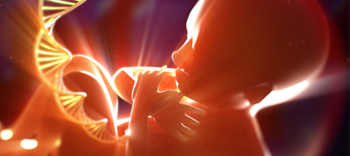Genetics
A recent study suggested that children with autism spectrum disorder disproportionately inherit contributing genetic variants from their parents. Explore this page to earn more about the genetic risk factors for autism.

Genetics play a strong role in the development of Autism Spectrum Disorders (ASDs). Autism is shared among 50-70% of identical (monozygotic) twins, compared with 0-10% of fraternal twins1,2,3. Moreover, 1-6% of children diagnosed with autism also have a sibling who is diagnosed with autism, a much higher rate than the general population4.
Further evidence for a genetic risk for autism comes from well-defined genetic disorders such as Fragile X syndrome, where a significant proportion of affected individuals develop autism5. Autism in these cases is known as syndromic autism due to its link with a particular syndrome.
Key Points
- Twin- and family-based studies show that autism is highly heritable.
- Autism affects predominantly males, with an estimated male to female ratio of 4:1.
- Autism is known as a complex genetic disorder since many different underlying genetic defects can cause the disorder.
- Some of the genetic risk factors associated with autism include: rare single gene mutations, common variants in susceptibility genes, and chromosomal abnormalities such as copy number variations (CNVs; see below).
Misconception
- Autism is caused by mutations in only one gene.
Fact
- ASD is thought to be caused by a combination of genetic and environmental factors. To date, variations in almost 300 genes have been associated with Autism Spectrum Disorders, and these explain less than 10% of individuals with autism.
Read about other misconceptions.
| References: |
|

